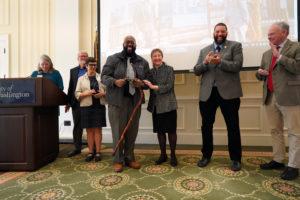During Black History Month and amid a flurry of fanfare, the City of Fredericksburg in partnership with the University of Mary Washington unveiled its civil rights trail: “Freedom, a Work in Progress.”

The nearly three-mile walking trail, with some stops a close drive, guides participants through post-Civil War history into the modern day, drawing together the stories – one never-before-heard testimony after another – of the Fredericksburg-area people and places that helped shape the civil rights narrative.
“I can’t even begin to describe to you what a fantastic day this is for the City of Fredericksburg and the University of Mary Washington, and more importantly for our Black community,” said Chris Williams, assistant director of UMW’s James Farmer Multicultural Center. He and Victoria Matthews, tourism stadium and sales manager for the City of Fredericksburg, spearheaded the project.
Featuring Virginia historical markers – one at the first stop on the 1961 Freedom Rides journey that challenged segregation of interstate travel – the trail’s 21 stops pull together a saga of persecution and peril, power and promise. They chronicle court rulings and protests from the Jim Crow era to the Black Lives Matter movement, stopping at churches, cemeteries, markers and monuments throughout the city, across the UMW campus and beyond.
“It is important to this community to know Fredericksburg’s story,” Mayor Mary Katherine Greenlaw said at the unveiling. “The Civil Rights trail and its remarkable wealth of history captured at each one of the sites … is part of our determination to tell the story of Fredericksburg, so that we know what to do going forward.”
Greenlaw noted the City’s dedication to uncovering Fredericksburg’s African American past, citing a multi-year community engagement campaign, as well as funds and additional staffing, allocated to achieving that goal.
Williams and Matthews share those ambitions. The pair should have met in fall 2019, when they both boarded a bus to retrace the Freedom Rides route. Amazingly, they never had the occasion to talk on that trip, but finding themselves at the same party months later, they struck up a conversation that revealed common interests and led to yesterday’s enlightening launch of the trail.
Fredericksburg’s new civil rights trail includes sites of history-making sit-ins, neighborhoods marred by segregation and locations that illustrate the efforts of Black artists, educators, entrepreneurs, students and others determined to make a difference.
In addition to Williams and Matthews, the trail was made possible by the efforts of many, including Fredericksburg tourism staff, UMW’s Simpson Library Special Collections and University Archives, and Mary Washington faculty and students who engaged in the work through courses in historic preservation, history and American studies, and geography.
“It opened my eyes to the huge impact Fredericksburg had on civil rights history,” said John Liberty ’22, who earned a bachelor’s degree from UMW last year, and was one of a handful of UMW students who worked with Professor of Geography Steve Hanna to create maps for the trail and its website. “Being able to be part of something that helps inform the local community and tourists about the significance of the local civil rights history was an amazing experience.”
Shiloh Baptist Church (Old and New Sites), the Fredericksburg Area Museum and the Slave Auction Site at the corner of William and Charles streets are among stops on the trail, which also includes a trek through the UMW campus. The James Farmer memorial on Campus Walk, in honor of the late civil rights icon and Freedom Rides leader who taught history at the University for more than a decade, is one of four Mary Washington sites.
“As it tells important histories, the civil rights trail project represents two important features of UMW,” said University of Mary Washington President Troy Paino. “It reflects our ongoing and productive partnership with the City of Fredericksburg, and the hands-on opportunities our students have to work with dedicated staff, faculty and community members on meaningful and transformative projects.”
U.S. Sen. Tim Kaine was among speakers at the Feb. 23, 2023, event, which was standing room only and drew members of Fredericksburg City Council and local leaders. Applause rang out for the elders from whom trail creators collected never-before-told oral histories, and for those in attendance who have played important parts in the struggle for civil rights in Fredericksburg.
“I am proud of how we have come together as a community – our city leadership, our university, our historians and our residents – to engage in important stories and create a more welcoming Fredericksburg,” said City Vice Mayor Charlie Frye Jr. “Fredericksburg is grateful to all who have contributed and continue to contribute to this process. As we celebrate this civil rights trail, we know that the work continues and there are many necessary steps ahead in Council’s commitment to tell a more complete Fredericksburg history.”
To learn more about this project, visit the website for Freedom, A Work in Progress: The City of Fredericksburg’s Civil Rights Trail. A trail booklet is available for download on the site, or one can be picked up in person at the Fredericksburg Visitor Center.





























